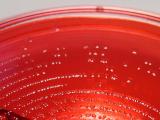A new study in Emerging Infectious Diseases and a report in the Center for Disease Control and Prevention's (CDC's) Morbidity and Mortality Weekly Report (MMWR) detail evidence of rising antibiotic resistant in shigellosis outbreaks among gay men.
Three different antibiotics have shown increasing resistance to Shigella, the third most common enteric bacterial pathogen in the United States. And all infections passed between men who have sex with men (MSM) were resistant to at least one antibiotic therapy, according to the Emerging Infectious Diseases study.
"Although shigellosis rates are highest for young children, most reports document ciprofloxacin- or azithromycin-resistant shigellosis largely among men who have sex with men," the authors wrote.
About 500,000 Americans are diagnosed as having shigellosis each year, including 500 deaths. Most patients will suffer from diarrhea, fever, and cramping. Shigella is highly contagious, passed through a fecal-oral route, and very common in daycare, school, or camp settings.
Researchers looked at 32 Shigella outbreaks from 2011 to 2015 and discovered that 9 clusters were resistant to one or more of the following: ciprofloxacin (3 clusters), ceftriaxone (2 clusters), or azithromycin (7 clusters). Three clusters were resultant to more than one drug.
Isolates from all 7 clusters involving MSM were resistant to at least one antibiotic, whereas only 2 of 25 non-MSM clusters involved resistant Shigella.
"Although our sample was small, the estimated prevalence of resistance to preferred antimicrobial drugs for MSM-associated shigellosis clusters was 3–77 times the prevalence for clusters with nonsexual transmission routes," the authors wrote. They added, "None of 10 clusters associated with child care, camps, or schools was caused by ciprofloxacin-, ceftriaxone-, or azithromycin-resistant strains."
The authors said the evidence suggests that clinicians treating MSM presenting with diarrhea or suspected Shigella infections be cautious of the growing problem of antibiotic resistance.
Physician counseling imperative
"The data we had to work with clearly showed that MSM are more likely than other populations to be at risk for drug-resistant Shigella," Anna Bowen, MD, an author of the study, told CIDRAP News. "These initial findings tell us we need additional research and enhanced surveillance.”
Bowen, a CDC epidemiologist, said counseling of MSM patients by doctors is imperative to prevent drug-resistant Shigella infections. "We need to emphasize hand hygiene, and preventing sexual transmission by using barriers in all sex acts," she said.
Shigella outbreak in Oregon
In a note from the field published today in MMWR, investigators, including Bowen, describedantibiotic resistance in a shigellosis outbreak in Oregon involving MSM and homeless people. From Jul 1, 2015, through Jun 30, 2016, 103 shigella infections were reported in that state, 75% in men.
Half of the men (38) identified themselves as MSM.
Forty-eight isolates were tested, and all were susceptible to ciprofloxacin. All were resistant to ampicillin and trimethoprim- sulfamethoxazole, and 13 isolates were resistant to azithromycin.
See also:
Aug 11 Emerg Infect Dis study
Aug 12 MMWR report



















